Is It Legal to Embed YouTube Videos in a Blog Post?
Published by Kenny Novak • Content Marketing • Posted December 6, 2018 ContentPowered.com
ContentPowered.com
YouTube is a tricky site. The legalities surrounding it, as the largest video host in the world, are a labyrinth. It should come as no surprise that pretty much every aspect of it comes under scrutiny sooner or later.
Right now, let’s talk about the legality of embedding a video on your website, in blog posts primarily. There’s more to talk about than you might think, but it’s also a clearer line than many assume.
Disclaimer: I’m not a lawyer and I have not contacted a lawyer to write this article. I could always be wrong, so don’t construe anything I say as legal advice. If you’re in a situation where there could be actual legal action taken against you, consult with a real copyright lawyer before relying on a blog post some dude you don’t know writes on the internet.
When You Own the Video
The first scenario is going to eliminate some discussion from the rest of this post, so I’m covering it now so I don’t need a caveat in every other section.
Basically, if you own the content and you’re the one who uploaded the video, it is 100% legal to embed the video on your website. You own it! There can’t possibly be a reason why it would be illegal for you to embed it. The only conceivable exception would be is if you created the content and then sold it, copyright and all, to someone else. If that other user decides they don’t want to let other people access that content, you embedding it could be a copyright violation.
The only case I can think of where this could possibly happen is if you’re a content creator with video skills and people hire you to create their videos, similar to how ghostwriters are paid to write blog content, ebooks and the like, and don’t have their names attached. If I ghost-wrote a book and then put that book on my personal website as a portfolio piece, it would raise some eyebrows, right? I got paid to write it, but my name isn’t credited as an author. To then claim I wrote it would be a violation of the agreement or contract I signed to produce the content.
Video content works the same way, since it’s still content. If I sign a contract to hand over the rights to a video, I no longer have the rights to the video. It’s pretty simple. Now, whether or not that makes it illegal to embed is another story. It just might be illegal – or at least a breach of contract – to claim I made it when I was hired to make it “under the table” so to speak.
The Image Argument
This is an argument I’ve seen in a few places, primarily TurboFuture. It goes like this. If you post an image on your website, you need to have reproduction rights to that image. There are numerous blog posts written about the legality of blog post images, including on this site.
Adding an image to your website is using that image. In order to use an image, you need permission. Either you need to be the copyright holder, or you need the permission of the copyright holder, or the image needs to be licensed under a creative commons license that allows free use of the image. There are additional restrictions and issues with image usage when it’s involved in commercial purposes, too. Image licensing is a mess.
This is compounded by the fact that so few webmasters actually understand this. There’s a pervasive and entirely incorrect perspective that “if it’s online, it’s fair game.” Just read some of the arguments on For Exposure. Artists deal with this all the time. “If they didn’t want me to take it, they wouldn’t have put it online!” Well, no, they put it online as part of their portfolio to sell their services. That doesn’t give you the rights to use it. The only reason they aren’t suing you is because lawsuits cost a lot of money and most artists are fairly poor.
The argument that TurboFuture makes is that embedding a video is similar to using an image on your site. The owner of the video automatically retains copyright – which is true – and to use it, you need to obtain permission. Is this true?
Well, one of the biggest problems with image usage is that it’s easy to save an image and upload it to your site, which is what most people do. You’re not embedding the image from another source, you’re using it locally. This means you’re likely stripping out attribution to do it. A video embed from YouTube is still a video hosted on YouTube. It still has a link to the host of the video, with all of the relevant information this entails. You also aren’t trimming out logos or endcaps from the video; all of the original information, attribution, and even calls to action are still there.
The image argument falls apart simply because videos are not images. Sure, they’re a high-speed collection of still frames, but that doesn’t make them governed by exactly the same laws.
YouTube’s Terms of Service
The official YouTube terms of use are a pretty big document full of legalese and fine print that pretty much everyone who uses the site glosses over, myself included. When was the last time you or anyone else read a full ToS or EULA? I’ve glanced through a few of them when it’s relevant for an article I’m writing, but I’ve never read all the way through one when signing up for a service.
In this case, there’s a clause in the YouTube terms that is relevant to our discussion. Particularly, it’s under section 6, subsection C. I’ll quote it here:
- “…by submitting Content to YouTube, you hereby grant YouTube a worldwide, non-exclusive, royalty-free, sublicensable and transferable license to use, reproduce, distribute, prepare derivative works of, display, and perform the content in connection with the service and YouTube’s (and it’s successors’ and affiliates’) business, including without limitation for promoting and redistributing part or all of the Service (and derivative works thereof) in any media formats and through any media channels. You also hereby grant each user of the service a non-exclusive license to access your Content through the Service, and to use, reproduce, distribute, display and perform such Content as permitted through the functionality of the service and under these Terms of Service. The above licenses granted by you in video Content you submit to the Service terminate within a commercially reasonable time after you remove or delete your videos from the Service. You understand and agree, however, that YouTube may retain, but not display, distribute, or perform, server copies of your videos that have been removed or deleted. The above licenses granted by you in user comments you submit are perpetual and irrevocable.”
Deep breaths. Whew. That’s a lot. There’s a lot going on in that long-winded legalese paragraph, so let’s break it down.
By uploading content to YouTube, you give YouTube a non-exclusive license to use your video content. They can use clips of your video in their marketing, embed your videos in their pages as examples of good or bad content, and generally do with it as they will, so long as the content remains on YouTube. If you choose to delete the videos, YouTube has a “commercially reasonable time” to remove their use of your content. So, you can’t delete a video and then immediately sue YouTube for using it in an ad; you have to give them a reasonable amount of time to remove and replace it. Additionally, they can keep local server copies of your content, which they do for both content ID purposes, legal archive purposes, and to restore it if you choose to un-delete it without having to upload it again.
The important part here is that you also grant every YouTube user a license to access your content, and to “use, reproduce, distribute, display, and perform such content as permitted through the functionality of YouTube and the terms of service.”
In other words, as long as YouTube’s terms permit it, any YouTube user can embed your content without needing to ask your permission, because you already GAVE them permission simply by uploading your content to YouTube.
Or, to turn it around as the person doing the embedding: if the content is publicly available on YouTube, and if the embed feature is enabled on the video, it’s 100% acceptable to embed the video in your content, so long as your use of it complies with the full terms of service.
If the person who uploaded the video disabled embedding – using this process – they are saying “this video is not allowed to be embedded.” You can’t embed it even if you try; you would have to work around the restriction by using iFrames, or by downloading and re-uploading the video, both of which are against the terms of service. The same goes for other restrictions, like “this video is unavailable in your country.”
When the Uploader Doesn’t Own the Video
There’s one more scenario you might run into, which is when the video you’re embedding is not an upload from the person who created the video. A movie, stolen and uploaded. A song or music video ripped from another service and uploaded. You know the drill; YouTube is chock full of this kind of thing. Is it still legal to embed the content?
The answer here is a little murky, so I’ll say both yes and no.
Yes, it’s legal to embed the content. You’re not hosting the content, and you didn’t steal the content. You have some responsibility to do at least some due diligence to find the original owner of any piece of content you want to reference or use, but you aren’t required to go out of your want for it. For content that violates copyrights, it’s the responsibility of both YouTube and the copyright holder to identify and police copyright violations.
Can you be sued for embedding a video uploaded by someone who doesn’t own the content? Maybe. I don’t know. Copyright law is a mess right now, and there hasn’t been a precedent set that I can find. Frankly, though, no copyright holder is likely to go after someone who embeds content; they want to go after the content thief. The only exception might be if you’re using that content on a monetized page and you’re making significant money from it. The copyright holder may find it worthwhile to sue you for making money from their content.
It is also likely against the AdSense (or Google Ads) terms of service to run ads on a page that hosts stolen content. Embedded videos that are identified as stolen can count, and might penalize your Google Ads account.
Relevant clauses in the YouTube terms of service are also in section 6.
- Subsection B: “You shall be solely responsible for your own Content and the consequences of submitting and publishing your Content on the Service. You affirm, represent, and warrant that you own or have the necessary licenses, rights, consents, and permissions to publish Content you submit; and you license to YouTube all patent, trademark, trade secret, copyright, or other proprietary rights in and to such Content for publication on the Service pursuant to these Terms of Service.”
- Subsection D: “You further agree that Content you submit to the Service will not contain third party copyrighted material, or material that is subject to other third party proprietary rights, unless you have permission from the rightful owner of the material or you are otherwise legally entitled to post the material and to grant YouTube all of the license rights granted herein.”
Basically: anyone submitting content to YouTube is claiming to be a licensed copyright holder or representative with legal right to upload the content. If someone steals content and you happen to be embedding it, it’s not your problem, it’s the problem of the thief. You may have a responsibility to report the copyright violation, but it’s not your copyright to police, so I wouldn’t worry about it too much.
Just be aware that if you’re embedding content from a content thief, that content is likely to disappear when a copyright strike is leveled against them and the content is deleted or the account is removed. Your embed won’t be long-lived. It’s better for you to find the original version to embed for your post.


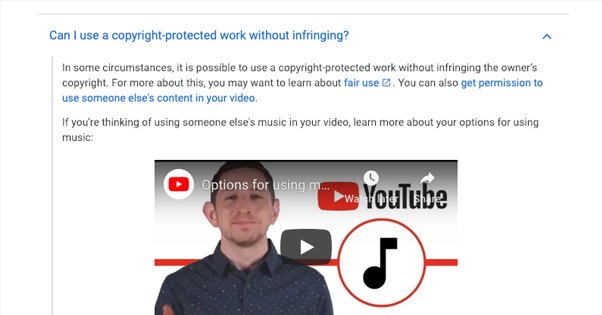
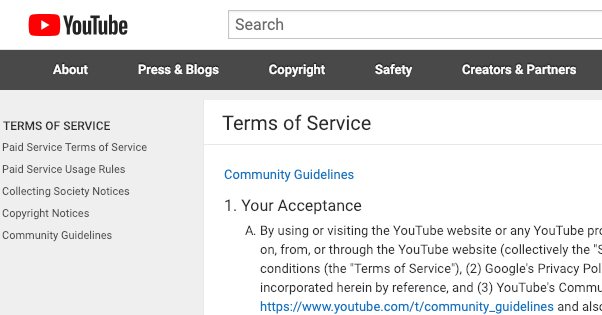
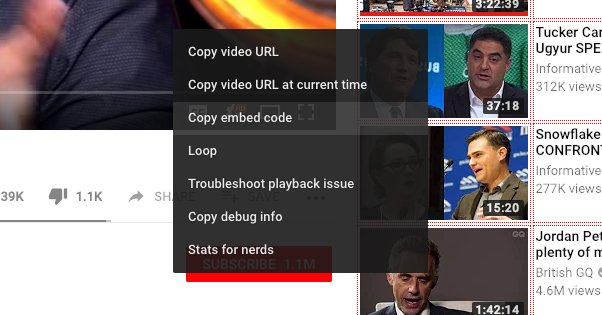
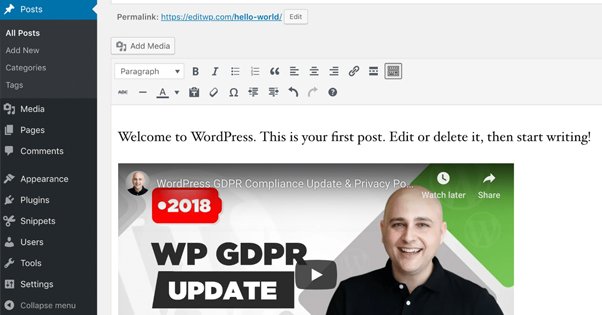
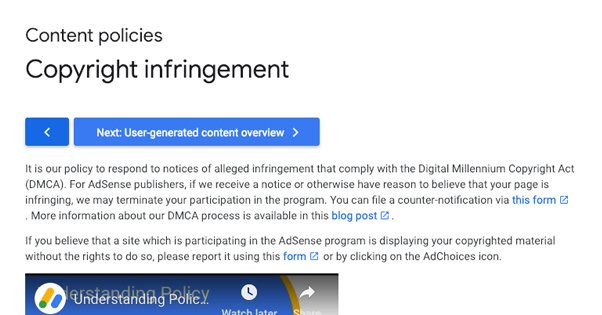





Actually, the courts have already ruled that you cannot be sued for copyright infringement for embedding a video that was illegally uploaded to YouTube. Only the person who originally uploaded it can be sued: https://mashable.com/2012/08/03/embedding-video-copyright-infringement/
Hey Scott, thanks for that interesting Mashable article. Good to know people are protected when they embed videos, even ones that may be pirated.